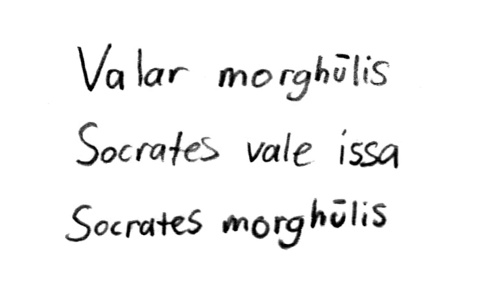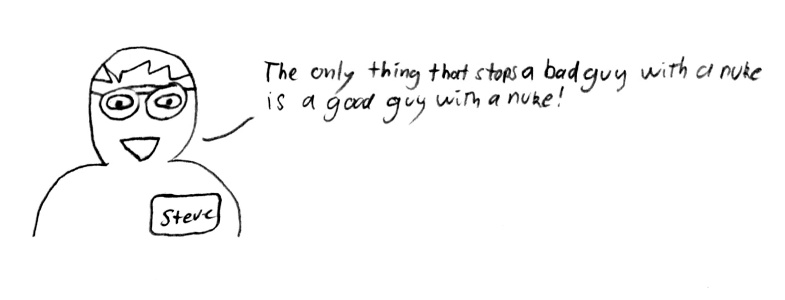
I recently read the amazing idea that, in order to adequately represent the gravity of nuclear war, America's nuclear launch codes should be stored inside the chest of a volunteer who accompanies the president at all times. To trigger the annihilation of the known world, the president would first have to butcher that volunteer with a knife. If you can't even kill one person, how can you order the deaths of millions?
Much earlier, I saw a very disappointing scene in the series Long Way Round, where Ewan McGregor and Charley Boorman have been given a lift through the worst of far-eastern Russia by some Russian truckers. The truckers stop to shoot a bear that has wandered onto the road, and McGregor loses it, wondering how they could kill a poor defenseless animal. Of course, he was eating meat the whole trip, but that was different because he didn't have to watch those animals die; someone else did that for him.
Alhough I eat meat, I think a reasonable price of entry to be part of carnivore club is to kill an animal yourself. Not every animal you eat, obviously, but at least one. I admit that I haven't done this mostly because of practicality, but if the opportunity came up I'd be willing to commit to either killing an animal with my own hands or giving up meat. Christopher Hitchens once accepted a similar challenge over his belief that waterboarding isn't torture. After being waterboarded he immediately changed his mind, which I respect a great deal.
I sometimes think about the abstractions we have in software and how blindly we accept them. It's so easy to write code up here in the clouds, but your modern web app is built on a web framework, on a programming environment, on a web browser, on another programming environment, on an operating system, on yet another programming environment, on CPU microcode that ultimately comes down to a bunch of transistors. Are you sure you're happy with all those tradeoffs? Did you even make them deliberately?
And lastly, what about all the conveniences of modernity, built from abstractions implemented on top of other people's lives? Alain de Botton's The Pleasures and Sorrows of Work pulls at a few of these threads, following a fish from its capture in the Maldives to its final resting place on a plate in Bristol via maybe 5 distinct businesses, among other examples. How many of us even know how to catch a fish, transport it, or package it for sale? It's so easy to pay someone else to do these things that unless you're Alain de Botton you probably don't even think about them.
But I think that to some extent we owe it to ourselves to challenge these abstractions, to ask them to prove their value. Write your own programming language, grow your own food, make your own furniture. I'm sure your attempts won't be that good, but at least you'll be knowingly rather than blindly accepting these abstractions. And if it came to it and you wanted to start over, wouldn't it be good to you know that you could?
I think of this idea as proof by example. That term is often used to describe the logical fallacy of generalising from a single example, but in this case I think of it as more of a kick-the-tires test that your generalisation should easily pass. Killing innocent people is sometimes justified? It's better to pay someone else to catch your fish? Operating systems are a good idea? These are all things that could well be true, but surely it's not too much to ask for a simple demonstration.

I was recently talking with some friends about the funny way that celebrities and public figures lose their own existence and become basically current-event-shaped cutouts for us to project our opinions onto. I think the video This is Phil Fish does a great job of making this point for a public figure in indie gaming.
To my mind, anything that is important because someone famous said it is probably not that important. Most of the time it's just a cheap way to signal identification with a particular group or latch on to that person's halo effect in some way. So I'd like to introduce a technique I came up with to help, I call it my friend Steve. You simply replace the name of the important public figure with "my friend Steve".
"Donald Trump just said that Mexicans can't count" is a classic opening to a long session of political chest-beating. However, "my friend Steve just said that mexicans can't count" is just... well, okay, your friend Steve is an idiot, but why are you telling me? "My friend Steve says that if you can't handle him at his worst, you don't deserve him at his best". Right. "You won't believe what my friend Steve just said about feminism on Twitter!" I bet I will believe it, and also that it won't matter very much.
On the other hand, my friend Steve says that theoretical science is inherently religious, though not in the sense of a particular god. He reckons that the level of effort and devotion that scientists put into seeking the truth can't be explained any other way. They often have to work hard for a long time, facing failures and setbacks, with little outside validation and sometimes outright hostility for their ideas. What are they holding onto that entire time? Surely if there's anything that deserves to be called religion, it's that.
That friend's name, of course... Albert Einstein. But you didn't need to know that; the idea was interesting enough without a celebrity behind it. Thanks, Steve!
I wanted to see if it would work well to make an instrument out of the singing bikes experiment, so I rigged up a one-octave keyboard version. I'm not sure it's a particularly compelling instrument, but it's pretty fun to click around randomly.
I also tried a slightly different and newer system for web animations this time, which probably means they'll work better on recent Chrome and super bleeding edge Firefox, and worse in everything else. But the new system let me rip out most of the gross animation code it took me a day to figure out last time. Goes to show you that picking the right horse can save you a lot of saddle pain.
There's a standalone (and two-octave) version on my demoserver and the code is, as always, on Github
It's good for the industry to be moving towards sustainable transport as quickly as possible. We open-sourced our patents to be try to helpful in that regard, so it's encouraging to see all this activity. From Tesla's standpoint, we want to take the set of actions that are likely to accelerate the event of sustainable energy.
— Elon Musk on electric vehicles
It's not about competing, it's really just about trying to increase the probability that the future will be good.
— Elon Musk on OpenAI
I think something will happen in the future. [...] If a bunch of companies try it and it doesn't work out then I think I'll try to at least do a demonstration system.
— Elon Musk on Hyperloop
Somebody should do it, and if somebody doesn't do it, then I think I should probably do it.
— Elon Musk on Neural Laces
I saw a cool extended interview with Elon Musk a little while ago, and what was most interesting about it was the way Musk would talk about his goals. For someone who's acquired a kind of Tony Stark reputation, he seems surprisingly ego-less, and at several points he expresses a motivation that he wants certain things to exist, or he wants the world to be a certain way, and he's not terribly concerned if it's him or someone else who gets us there.
I think there's an interesting underyling intuition there, a kind of generalisation of the thought process in Rep the truth, and also some stuff in A strange game and Middle-out. The point being that, although it's easiest to focus your attention on and around you, there's a much larger area beyond that. Instead of asking how you should behave, you can ask "how do I want the world to be, and what will bring it closer to that ideal?" Instead of locally optimising your actions, you are trying to optimise the entire state of the world.
Crucial to that idea is that personal responsibility isn't a terribly useful concept. Are you responsible for the actions of your government in overseas wars? If you see someone drowning do you have to dive in and save them? Do you have a moral obligation to go to Africa and save orphans from malaria? Well, all of that is kind of missing the point. Do you want a world with less war, drowning and malaria? If so, you can take some actions that will bring this world closer to that world. Whether or not it's your fault or your responsibility doesn't really change that.
Which also means that maybe it's not such a big deal whether you keep ownership of the things you create. If someone is willing to take those things and do them better than you, or even just do them roughly as well, the main consequence is that the world is still being optimised, but with less effort on your part. That's a good thing, and means you can free yourself up to work on a different part of the goal.
It also means there's a lot of benefit in sharing your ideas as widely as you can, not with fear that someone will steal them, but with hope that they might. Really, it would be the best possible outcome if everyone stole all of your ideas, and those ideas went on to influence others to share your goals and make the world more like the world you want. Maybe that wouldn't be as nice for your ego, or lead to you being famous, but the ideas you helped grow could be famous and powerful on their own.
I think that's a good model for success in the field of ideas. Less like a king than a really good gardener.


